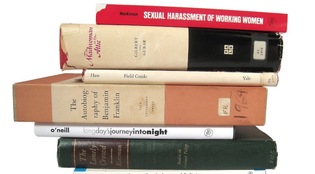 loading
loading
Press run View full imageHow Yale is Yale University Press? Well, it's Bluer than it once was. In 1961, then-president Whitney Griswold made the separately incorporated press an administrative department of the university. "The speculation was that Griswold worried that the press was becoming politically conservative, and he wanted to nip that in the bud," says finance and operations director John Rollins, who was about ten years old at the time.
Both Rollins and Donatich emphasize that the arrangement with the university, which has Donatich reporting directly to Yale president Richard Levin, doesn't obligate the press to publish Yale authors. "We don't have any written obligation to publish books by Yale faculty, but we want to reflect the values and strengths of the university," Donatich says. YUP has published The Work of the University, by Levin, The Good of This Place by former Yale College dean Richard Brodhead '68, '72PhD (now the president of Duke), and several other books by Yale panjandrums. Yale offers a lot: a fertile intellectual garden and a decent place to live for YUP's hundred-odd staffers, who don't have to fight the commuter trains and subways like their Manhattan counterparts. Deep pockets, too. When Donatich wanted to buy Doubleday's renowned Anchor Bible scholarship series, the university extended him a $1 million credit line. Today, it's the Yale Anchor Bible series, one of three series for which YUP will start digitizing. (Another is the Annals of Communism, which has a grant to digitize Stalin's personal archive.) Yale giveth, but Yale also withholds. While it is true that venerable Yale scholars like Vann Woodward and Edmund Morgan have published best-selling books with YUP, Donatich is hyper-aware that Yale mega-sellers like Paul Kennedy, or John Lewis Gaddis, or Jonathan Spence '65PhD, who sits on the YUP board of governors, prefer to publish with the likes of Penguin and Random House. Publishing is a harsh mistress. After 25 years in the business, as a traveling sales representative, an editor, and an executive, Donatich tried being a scribbler. Three years ago he wrote Ambivalence, A Love Story: Portrait of a Marriage, an intimate account of his marriage to literary agent Betsy Lerner. Donatich learned what all authors learn: it's a jungle out there. The reviews were respectful, but mixed. "The memoirist may seem too self-absorbed or misanthropic for some," Publishers Weekly opined. "I really enjoyed writing it, but I didn't enjoy publishing it," Donatich admits.
What's next for the press? Maybe a modest "rebranding," ditching the famous logo in favor of the Yale University logo. And, of course, plenty more publishing. For highbrows: a philanthropically endowed series of literary translations called the Cecile and Theodore Margellos World Republic of Letters, offering contemporary Chinese fiction and new poetry collections of Italy's Umberto Saba, Greece's Kiki Demoula, and others. For regular folks: The Bagel, by Maria Balinska, which might reasonably be seen as a follow-on to Josh Ozersky's well-received The Hamburger. "I think we have a fun book on orange juice in the works," Donatich says, impishly. Donatich says he doesn't like to be bored, and with one of the most eclectic catalogues in publishing -- if the lichens don't grab you, then Bob Dylan will -- there is little chance of that. He knows YUP will publish wonderful books, successful books, books that fail, and frivolous books; "but I'm lucky enough to say that I won't publish a bad book." Can your publisher say that?
The comment period has expired.
|
|